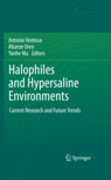
Halophiles and hypersaline environments: current research and future trends
Ventosa, Antonio
Oren, Aharon
Ma, Yanhe
This book presents the latest results in the exploration of halophilic bacteria, archaea, fungi and viruses. Basic and molecular aspects as well as possible biotechnological applications of halophiles are highlighted by leading scientists. Topics include: the family Halomonadaceae; the hypersaline lakes of Inner Mongolia ; Salinibacter ruber - from genomics to microevolution and ecology; the impact of lipidomics on the microbial world of hypersaline environments; molecular mechanisms of adaptation to high salt concentration in the black yeast Hortaea werneckii ; viruses in hypersaline environments; initiation and regulation of translation in halophilic Archaea; protein transport into and across haloarchaeal cytoplasmic membranes; protein glycosylation in Haloferax volcanii ; the effect of anoxic conditions and temperature on gas vesicle formation in Halobacterium salinarum ; halophiles exposed to multiple stressors; cellular adjustments of Bacillus subtilis to fluctuating salinities; the nature and function of carotenoids in Halobacillus halophilus ; xanthorhodopsin; enzymatic biomass degradation by halophilic microorganisms; and enzymes from halophilic Archaea. Written by leading experts. Richly illustrated. Covers basic aspects as well as possible applications. INDICE: Helge Larsen (1922-2005) and his contributions to the study of halophilic microorganisms. The halophilic world of Lourens Baas Becking. Taxonomy, phylogeny and biotechnological interest of the family Halomonadaceae. The hypersaline lakes of Inner Mongolia – the MGAtech project. From genomics to microevolution and ecology: the case of Salinibacter ruber. Impact of lipidomics on the microbial world of hypersaline environments. Molecular mechanisms of adaptations to high salt concentration in the extremely halotolerant black yeast Hortaea werneckii. Viruses from the hypersaline environment. Haloviruses of Great Salt Lake: a model for understanding viral diversity. Initiation and regulation of translation in halophilic Archaea. Protein transport into and across haloarchaeal cytoplasmic membranes. Salty and sweet – Protein glycosylation in Haloferax volcanii. Effect of anoxic conditions and temperature on gas vesicle formation in Halobacterium salinarum. Halophiles exposed concomitantly to multiple stressors: adaptive mechanisms of halophilic alkalithermophiles. Cellular adjustments of Bacillus subtilis and other Bacilli to fluctuating salinities. The nature and function of carotenoids in the moderately halophilic bacterium Halobacillus halophilus. Xanthorhodopsin. Enzymatic biomass degradation byhalophilic microorganisms. Enzymes from halophilic Archaea: open questions. Ashort history of the symposia on halophilic microorganisms: from Rehovot 1978to Beijing 2010.
- ISBN: 978-3-642-20197-4
- Editorial: Springer Berlin Heidelberg
- Encuadernacion: Cartoné
- Páginas: 350
- Fecha Publicación: 01/06/2011
- Nº Volúmenes: 1
- Idioma: Inglés
